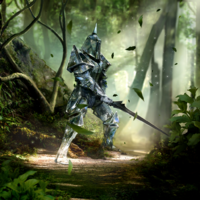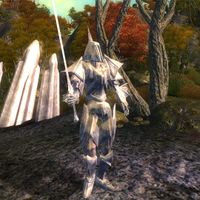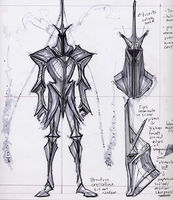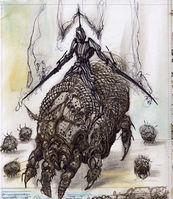Lore:Knight of Order
The Knights of Order are mindless Daedric[1][nb 1] soldiers resembling crystalline-armored knights. They serve the Daedric Prince of Order, Jyggalag, and make up one part of the Forces of Order, which also includes the Priests of Order and Jyggalag. Their origins and their goals are unknown. They are soulless warriors that kill without hesitation, and it is therefore highly advised to destroy them on sight.[2] They are said to be without "a bit of original thought in their lifeless husks".[3] They are only ever encountered during the Greymarch at the end of every era, during which they are summoned to the Shivering Isles via the Obelisks of Order that dot the landscape of the realm, wreaking havoc in anticipation of Jyggalag's return.[4] The Knights are drawn to Obelisks like "flies to honey", and are summoned by Priests of Order though chanting and rituals.[3]
They are naturally attracted to the Resonator of Judgment in the ruins of Xedilian, which was made from the obelisks.[2] The Knights of Order are naturally resistant to magic and poison.[4] Hearts of Order are a rare alchemic ingredient harvested from the chest of a fallen Knight. These are utilized by Priests of Order as keys and power sources. Three hearts are enough to overload an active Obelisk of Order, temporarily deactivating it and allowing its Priest to be killed.[5][6][7] Circa 4E 201, the manic wizard Thoron seemingly made use of these hearts together with the Sword of Jyggalag when attempting to open a pathway to the Isles from Tamriel.[8]
Gallery[edit]
Notes[edit]
See Also[edit]
- For game-specific information, see the Shivering Isles and Legends
 articles.
articles.
References[edit]
- ^ Knight of Order card in Legends
- ^ a b c Kiliban Nyrandil's dialogue in Oblivion: Shivering Isles
- ^ a b Sheogorath's dialogue in Oblivion: Shivering Isles
- ^ a b Knights of Order in Oblivion: Shivering Isles
- ^ Crystal Chest in Oblivion: Shivering Isles
- ^ Obelisk of Order in Oblivion: Shivering Isles
- ^ Haskill's dialogue in Oblivion: Shivering Isles
- ^ Thoron in the Saints & Seducers Creation for Skyrim Special Edition
- ^ Interview With Two Denizens of the Shivering Isles — Haskill and Dyus
Note: The following references are considered to be unofficial sources. They are included to round off this article and may not be authoritative or conclusive.




